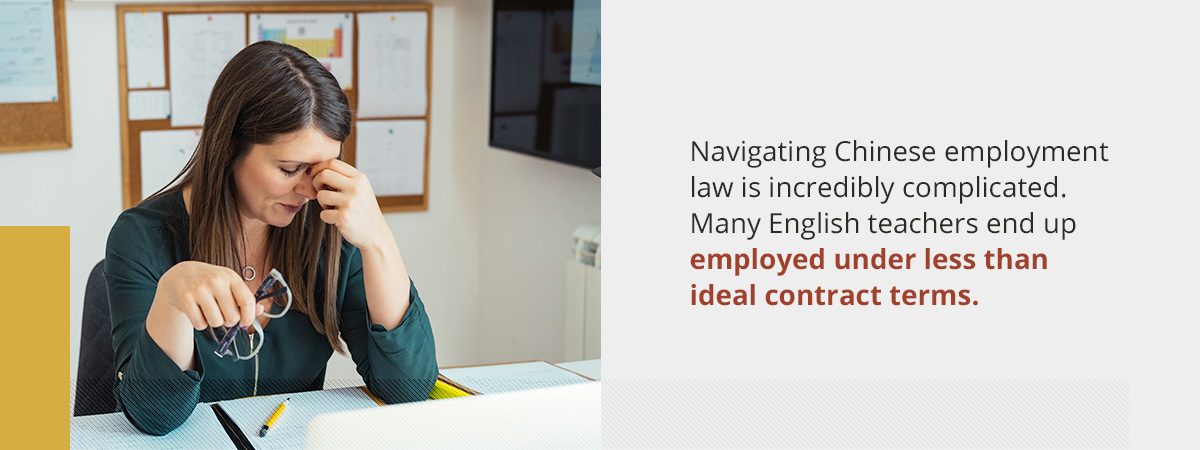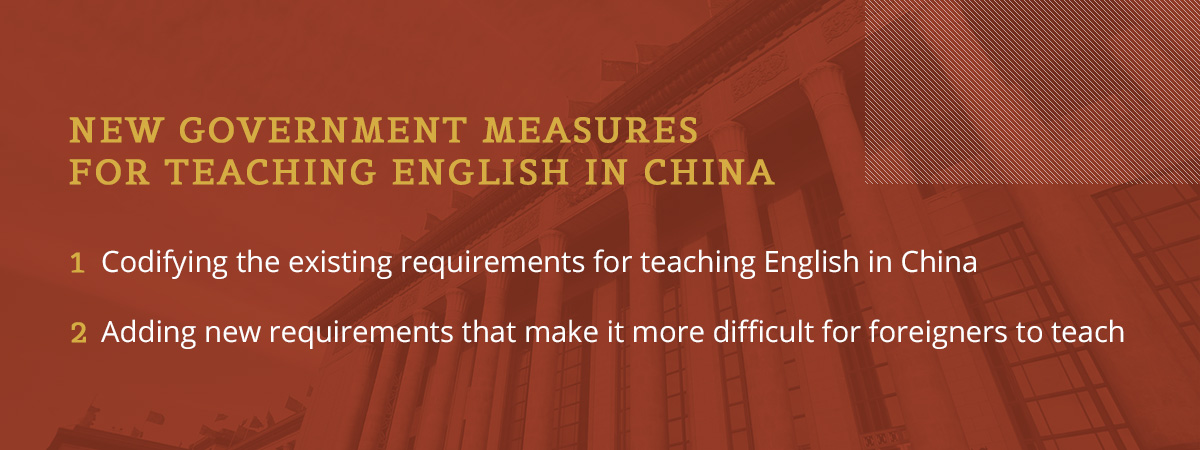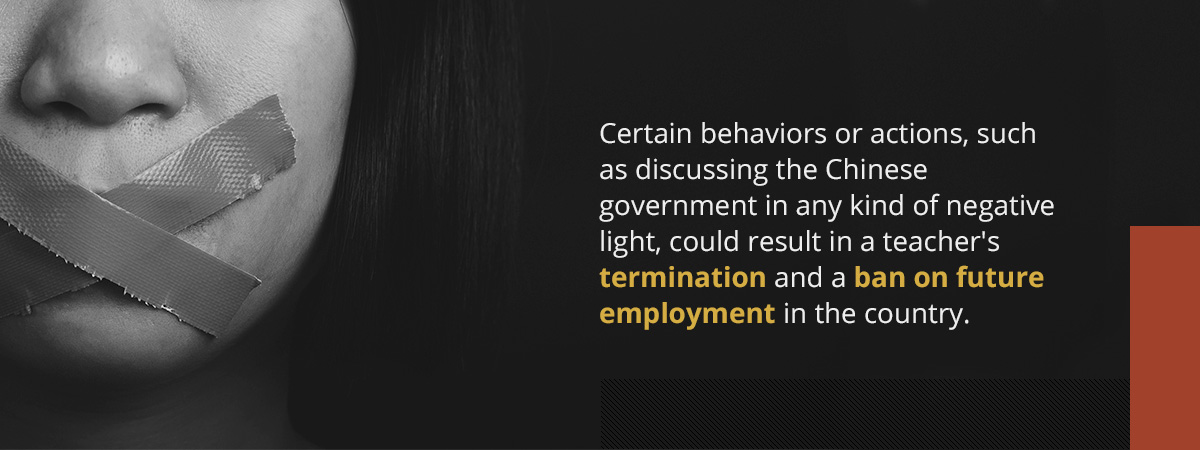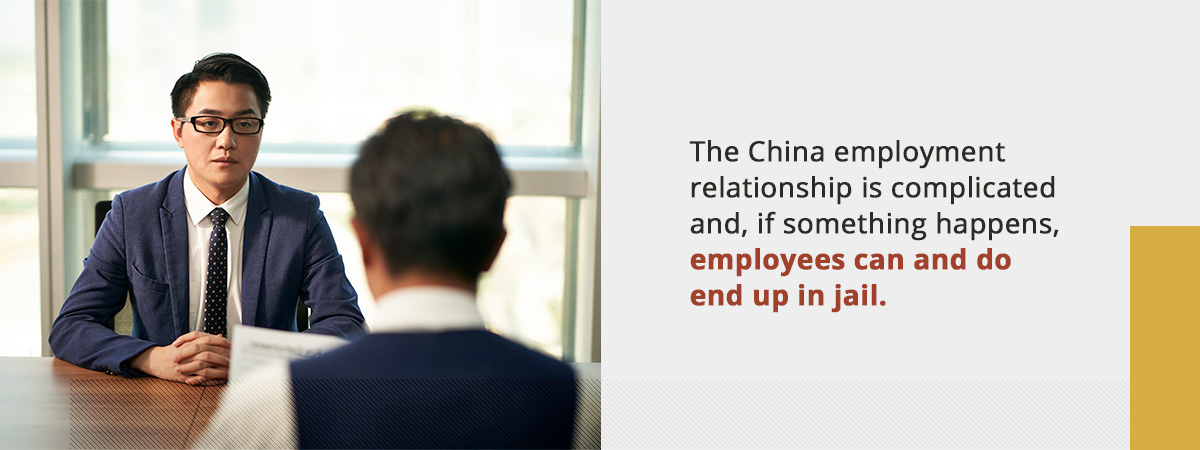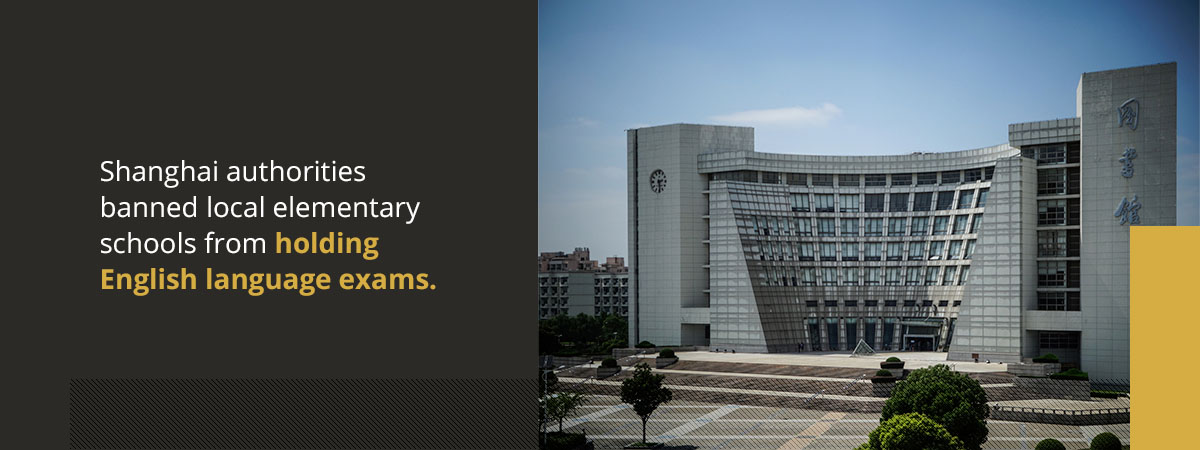If you are thinking about taking a job teaching English in China, I strongly urge you not to do it. Look for such a job in Vietnam, Thailand, Japan, Spain, Mexico, Colombia, Brazil, the Czech Republic or really just about any other countries that teach English in their schools. I wrote this sentence and this post originally back in 2019. With all that has happened in China since then — most particularly, COVID and the increasing tensions that has wrought between local Chinese and the foreigners who live in China, my views on this have only hardened. Considerably.
The other important thing I would like to add in this post “refresh” is that what is true for teachers employed in China has become increasingly true for all foreign employees in China.
Spoiler alert: Even if you specifically want to teach English to children, you should still avoid going to China at all costs. I say this because teaching English in China has become extremely risky, especially for teachers who do not speak Chinese. Let me explain.
Some Background: What We Do
My law firm’s international lawyers have always gotten a steady stream of emails from English teachers in foreign countries who are stuck dealing with:
- Criminal law issues: Some English teachers find themselves on the wrong side of Chinese law enforcement without knowingly having done anything warranting arrest.
- Late or missing payments: Many teachers receive work payments late — if they receive them at all.
- Visa or passport issues: Teachers who are working on the wrong visa can end up jailed or deported.
- Problems with employment contracts: Even with an English translation, navigating Chinese employment law is incredibly complicated. Many English teachers end up employed under less than ideal contract terms.
- Issues with starting a school: Typically, the emails my firm receives regarding the establishment of a new school come from people who have been teaching English abroad for a while. They want to know what it will take to open a school for foreign students in their host country.
- Medical and landlord problems: These emails often come down to money. For example, “The hospital wants $400,” or “My landlord wants to raise rent by $100 a month.” As a father, my responses to these are usually nine parts paternalistic, one part legal.
Pretty routine stuff, right? Yes and no — and it is the “no” that led me to write this post.
Our writings, our legal work and our various international school connections mean we get 10-20 emails every month from people teaching around the world who are dealing with the above issues. Note that the number of such emails we get has been reduced tremendously, as China — in an effort to reduce foreign influences — has greatly reduced its number of foreign teachers and as its quarantine rules have made even those with job offers think twice.
Although we don’t usually handle matters such as these, we do try to help to the extent we can. That assistance usually consists of “fly-by” legal or career help or even emotional support. We view helping these teachers as a sort of public service, even though we have never made a single cent from representing an English teacher anywhere in the world.
We do this because many of our lawyers and staff attended international schools or are sons or daughters of teachers or professors. I spent my junior year of high school at Robert College in Istanbul, a year studying Spanish at LAE Madrid and eight months studying French at the Institut de Touraine. All three are amazing schools, and these were some of the best years of my life.
Our law firm also has a long history of representing universities and international schools in their international legal work — one of our lawyers does a ton of work with international schools — ranging from helping them set up in foreign countries to licensing technology they’ve developed to foreign companies.
The Problems With Teaching English in China
One of the strongest reasons for going to China to teach is experiencing the country’s rich culture — and the money. Teaching English in Asia can be a lucrative, exciting opportunity when you’re lucky enough to work with a trustworthy employer and you manage to stay on the government’s good side.
However, it’s entirely too easy for foreign workers to end up in sticky situations. Since relations between China and the West — specifically, the English-speaking West — started rapidly declining a few years ago, the number of emails we’ve received from struggling English teachers has increased exponentially.
New Government Measures for Teaching English in China
In 2020, the Chinese Ministry of Education released a draft of the new Measures for the Hiring and Management of Foreign Teachers to the public for comment. This document both addresses some of the education sector’s problems and increases government control over the sector in two ways:
- Codifying the existing requirements for teaching English in China
- Adding new requirements that make it more difficult for foreigners to teach
Foreign teachers are now required to have a bachelor’s degree or higher and two or more years of teaching experience. This requirement goes for all foreign teachers working in China — those teaching foreign students as well as those working with Chinese students.
Additionally, the Measures state that the behavior of foreign teachers is being logged into China’s social credit systems and will be used to determine teacher integrity and trustworthiness. Certain behaviors or actions, such as discussing the Chinese government in any kind of negative light, could result in a teacher’s termination and a ban on future employment in the country.
This censorship is at the heart of the government’s purported rationale for needing greater oversight of foreign teachers. The ultimate goal is to clean up China’s education sector and regain full control over all education being delivered to its children.
These Measures are increasingly being enforced, and I expect that will continue. This will make it more challenging for schools to hire qualified foreigners with clean social credit records.
Passport and Visa Issues
It is estimated that over 50% of foreigners working in China lack valid work visas and/or residence permits — many of these workers are in the education sector. This happens because China deliberately makes these visas/permits difficult to obtain. The Chinese Communist Party (CCP) wants to regain control of China’s education sector to ensure that foreign teachers are qualified and will refrain from teaching “subversive” foreign ideas.
As a result, it appears that many schools have foreign teachers come to China and begin working with tourist visas, rather than the proper work and/or residence visas. All the while, the schools claim this practice is perfectly legal. It isn’t.
As far as I can tell, the schools rarely, if ever, get in any real trouble for doing this — but the teachers sure do. Teachers who are caught with an improper visa for teaching in China are often tossed in jail and then deported, or just deported immediately.
We almost always have to punt on these issues because our immigration law expertise is mostly limited to business immigration to the United States, with a smattering of additional knowledge gleaned from the transactional work we do in Asia and Europe.
When we do get an email about visa and passport issues, we typically urge the teacher to seek out a local immigration lawyer for assistance. Or, if they trust and like their employer, we suggest they work with the school to try to solve the issue. Occasionally, we suggest the teacher leave the country.
Criminal Law Issues
These situations typically involve bar fights, payment disputes with cab drivers, cybersecurity violations or cannabis possession. Our response is usually to suggest the teacher retains a local criminal lawyer — and fast.
In 2019, teachers working for Switzerland-based education company Education First (EF) in China were arrested at alarming rates for minor criminal offenses. Even more concerning, Chinese police picked up EF teachers from their homes, workplaces and nightclubs to bring them in for questioning and drug testing. Similar situations have occurred to English teachers at many other schools since then.
Regarding our own experience, the most common emails we receive include:
- Drug testing: The government tests many teachers for cannabis using hair samples and jails them for several days — or longer. They then get deported. This happens even to newly arrived teachers who insist they did not consume any cannabis since entering China. Listen up, everybody — cannabis can appear in hair up to and even beyond 90 days after consumption. If you’re going to teach in China and you want to avoid jail time, avoid using cannabis for at least four months before your arrival.
- Physical altercations: Our advice to English teachers who are in jail for a fight is to have someone close to them work with their home country’s embassy to secure a good local criminal lawyer. We urge them to act quickly and, if at all possible, secure financial support from their family. We also urge them not to publicize their case unless and until their retained lawyer suggests they do so, which is rare.
Lack of Payment
I once received an email from one teacher who said she and another 75+ teachers in her city — all working in different schools — had not gotten paid for months. Another email mentioned nine teachers in another city who also had not been paid.
Add to this the almost daily emails I get from teachers who do not get their last paycheck, the airfare reimbursements or the bonuses they were promised, and it becomes clear that it is open season against foreign teachers in China. These schools clearly believe they can blow off paying their teachers with impunity — and they’re right.
When teachers ask me what they should do about getting paid, my usual response is to say that they can retain and pay a local Chinese attorney to try to get paid. However, the odds of a foreign teacher prevailing on such a claim are slim. Pushing to get paid at all can have all sorts of negative ramifications for teachers.
Schools will pull teachers’ work visas or refuse to assist in moving them to a new employer. They may also seek to have teachers deported so they can avoid paying the owed wages. It’s also common for schools to make up claims about their teachers and threaten to make sure they will never work in China again. Therefore, you need to think long and hard about whether getting bogged down in these sorts of disputes is worth potentially harming your long-term career prospects.
Problems With Employment Contracts
The typical email we get regarding contract disputes will say something like, “I am a teacher in China, and I have been fired for taking a day off because my sister came to visit. Can my school do this?”
Without much context, we can’t answer whether your school can legally do this. However, we can say that challenging the school could lead to you losing the ability to work in China in the future. There’s also a good chance you’ll end up losing your visa — trust me, pursuing this dispute will not be worth the time and money you’ll spend to do it.
From beginning to end, the game is rigged against English teachers in China. The China employment relationship is complicated and, if something happens, employees can and do end up in jail.
The only relevant portion of a China employment contract is the Chinese portion — and the odds are very likely that the English section contains an imperfect translation that favors the Chinese-speaking parties in the contract. Even if you can read the Chinese portion, you will likely not fully understand the terms and conditions unless you have comprehensive knowledge of China’s employment laws in the specific locale in which you are working.
Getting fooled by the English portion of the employment contract happens to foreign workers across all industries. Essentially, if you cannot fluently read or speak Chinese, you probably don’t know what’s in your contract. This is a risk you don’t want to take.
Our China employment lawyers consistently represent high-level Chinese employees in their employment contract negotiations, but English teachers simply cannot afford such assistance. This makes them incredibly vulnerable from day one — and their employers virtually always seek to take advantage of them.
I have concluded that the best thing English teachers can do to protect themselves from these situations is to avoid teaching in China to begin with. Go elsewhere. And if you are currently teaching in China, leave now or just resign yourself to your fate.
Foreign Workers in General
This cautionary warning goes for more than just teachers. Many Chinese companies hire foreigners illegally because doing so can save them a ton of money with very little risk involved — for them, at least. These situations teachers find themselves in are more common than you would think in other industries.
For example, the detention of two Irish women for working side jobs at an unlicensed school in Beijing shines a spotlight on the illegal English education market in China. Both teachers had visas that allowed them to work full-time in China, but only with the employer who had secured those visas for them. The teachers had taken lucrative part-time teaching jobs on the side, which got them arrested.
The big takeaway is that employers regularly hire foreigners illegally. When someone discovers their illegal employment, the foreign worker is forced to take the blame.
Reduced Teaching Hours
In 2021, the General Office for the Chinese Communist Party issued Opinions on Further Reducing the Burden of Students’ Homework and Off-Campus Training in Compulsory Education.
The Opinions are already impacting the private education sector. The CCP recently mandated that after-school tutoring hours be drastically reduced. This mandate has forced many education companies in China to reduce or cancel their tutoring offerings.
Chinese schools are also increasingly removing English classes from their curricula. Just last year, Shanghai authorities banned local elementary schools from holding English language exams — a surprising decision for a city with so many international residents.
While the government claims this ban was intended to reduce the burden faced by Chinese students, many speculate it’s part of a campaign to push back against Western influence. Either way, with fewer English classes being taught, it will be even more difficult for English teachers to secure jobs in Chinese schools.
The Bottom Line
I do not believe all schools in China cheat or mistreat their teachers, but I am convinced many schools do. Additionally, so few English teachers who choose to go to China have the resources or knowledge to figure out which schools are reputable or navigate the visa and contract minefields. In my opinion, the odds of having problems are just too high to warrant the trip — especially with the recent legal changes.
Living, working and doing business in China is far more legally complicated than it was 10 years ago, and tolerance of foreigners in China — particularly for Americans, Canadians, Australians and Africans — has declined significantly. This means the likelihood that you will end up on the wrong side of Chinese law is considerably higher as well.
The tougher standards required for foreign teachers to obtain work visas and increasing crackdowns on those improper visas make it extremely difficult for foreigners to teach in China. Plus, there’s the near impossibility of any foreigner getting into China these days because of COVID. All these factors have led to a marked decrease in foreign teachers, which is exactly what the CCP wants.
When you combine all these issues, teaching English in China is simply not worth the risk. That goes for employees in other industries as well — how China treats foreign teachers has always been a reflection and harbinger of how it treats all foreigners.
However, many people have noted that government schools in China are a safer bet, and I would like to note that I do not recall ever receiving emails regarding problems with Chinese government school positions. For those who have taught in China — what was your experience like?












